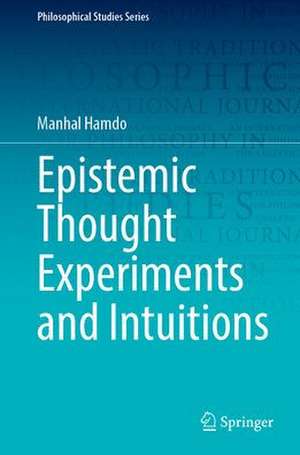Epistemic Thought Experiments and Intuitions: Philosophical Studies Series, cartea 150
Autor Manhal Hamdoen Limba Engleză Hardback – 29 iun 2023
Din seria Philosophical Studies Series
-
 Preț: 399.58 lei
Preț: 399.58 lei - 15%
 Preț: 631.92 lei
Preț: 631.92 lei - 18%
 Preț: 1097.47 lei
Preț: 1097.47 lei - 18%
 Preț: 985.06 lei
Preț: 985.06 lei - 15%
 Preț: 627.11 lei
Preț: 627.11 lei -
 Preț: 373.56 lei
Preț: 373.56 lei -
 Preț: 383.74 lei
Preț: 383.74 lei - 15%
 Preț: 627.93 lei
Preț: 627.93 lei - 15%
 Preț: 626.33 lei
Preț: 626.33 lei - 18%
 Preț: 1196.74 lei
Preț: 1196.74 lei - 18%
 Preț: 927.99 lei
Preț: 927.99 lei - 18%
 Preț: 936.20 lei
Preț: 936.20 lei - 18%
 Preț: 931.71 lei
Preț: 931.71 lei - 15%
 Preț: 632.42 lei
Preț: 632.42 lei - 15%
 Preț: 628.41 lei
Preț: 628.41 lei - 15%
 Preț: 631.77 lei
Preț: 631.77 lei - 18%
 Preț: 931.40 lei
Preț: 931.40 lei -
 Preț: 378.26 lei
Preț: 378.26 lei - 15%
 Preț: 631.77 lei
Preț: 631.77 lei - 15%
 Preț: 629.19 lei
Preț: 629.19 lei - 15%
 Preț: 630.46 lei
Preț: 630.46 lei - 18%
 Preț: 925.84 lei
Preț: 925.84 lei - 15%
 Preț: 625.84 lei
Preț: 625.84 lei - 20%
 Preț: 553.21 lei
Preț: 553.21 lei - 20%
 Preț: 560.27 lei
Preț: 560.27 lei - 18%
 Preț: 932.01 lei
Preț: 932.01 lei - 18%
 Preț: 875.30 lei
Preț: 875.30 lei - 20%
 Preț: 566.73 lei
Preț: 566.73 lei - 18%
 Preț: 932.48 lei
Preț: 932.48 lei
Preț: 713.24 lei
Preț vechi: 869.81 lei
-18% Nou
Puncte Express: 1070
Preț estimativ în valută:
136.48€ • 143.59$ • 113.29£
136.48€ • 143.59$ • 113.29£
Carte tipărită la comandă
Livrare economică 15-29 ianuarie 25
Preluare comenzi: 021 569.72.76
Specificații
ISBN-13: 9783031334795
ISBN-10: 3031334795
Ilustrații: XVIII, 178 p.
Dimensiuni: 155 x 235 mm
Greutate: 0.45 kg
Ediția:2023
Editura: Springer International Publishing
Colecția Springer
Seria Philosophical Studies Series
Locul publicării:Cham, Switzerland
ISBN-10: 3031334795
Ilustrații: XVIII, 178 p.
Dimensiuni: 155 x 235 mm
Greutate: 0.45 kg
Ediția:2023
Editura: Springer International Publishing
Colecția Springer
Seria Philosophical Studies Series
Locul publicării:Cham, Switzerland
Cuprins
Introduction.- Chapter 1: Epistemic Thought Experiment and Intuition.- Chapter 2: The Nature of Epistemic Intuition.- Chapter 3: The Epistemic Status of Intuitions.- Chapter 4: Epistemic Intuition in Light of Intuition-Deniers.- Conclusion.- Bibliography.
Notă biografică
Manhal Hamdo is a postdoctoral research fellow at Freie Universität Berlin - Institut für Philosophie. His key focus is analytic philosophy, primarily epistemic intuition, thought experiments, knowledge skepticism, and the self. He wrote his PhD dissertation, published various papers, and participated in several conferences on intuition.
Textul de pe ultima copertă
This work investigates intuitions' nature, demonstrating how philosophers can best use them in epistemology. First, the author considers several paradigmatic thought experiments in epistemology that depict the appeal to intuition. He then argues that the nature of thought experiment-generated intuitions is not best explained by an a priori Platonism. Second, the book instead develops and argues for a thin conception of epistemic intuitions. The account maintains that intuition is neither a priori nor a posteriori but multi-dimensional. It is an intentional but non-propositional mental state that is also non-conceptual and non-phenomenal in nature. Moreover, this state is individuated by its progenitor, namely, the relevant thought experiment. Third, the author provides an argument for the evidential status of intuitions based on the correct account of the nature of epistemic intuition. The suggestion is the fitting-ness approach: intuition alone has no epistemic status. Rather, intuition has evidentiary value as long as it fits well with other pieces into a whole, namely, the pertinent thought experiment. Finally, the book addresses the key challenges raised by supporters of anti-centrality, according to which philosophers do not regard intuition as central evidence in philosophy. To that end, the author responds to them, showing that they fail to affect the account of intuition developed in this book.This text appeals to students and researchers working in epistemology.
Caracteristici
Illustrates the connection between thought experiments and intuitions within philosophy Focuses on paradigmatic thought experiments within epistemology Offers both a thinly conceptual and argument friendly view of intuition
